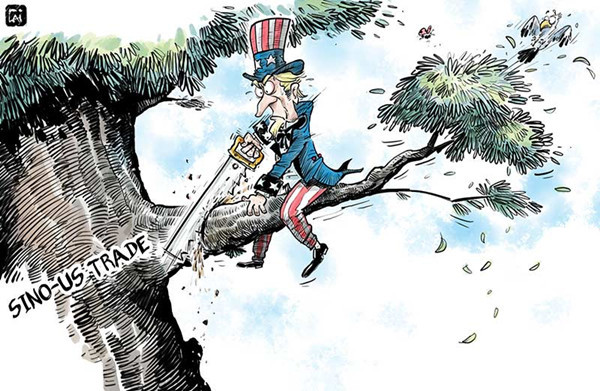
Sino-U.S. trade / (China Daily)
On Aug 18, U.S. Trade Representative Robert Lighthizer formally initiated an investigation to determine whether the actions, policies and practices of the Chinese government in the fields of technology transfer, intellectual property and innovation are discriminatory and burden or restrict U.S. trade. Based on the findings of the investigation under Section 301 of the U.S. Trade Act of 1974, U.S. President Donald Trump will eventually decide whether or not to impose extra tariffs or other trade restrictions on China.
The probe into China's new energy industry in September 2010 was the last the U.S. initiated under Section 301, which it eventually withdrew after the two sides resolved the issue through negotiations, according to which the Chinese enterprises involved made certain systemic adjustments.
Sino-U.S. economic and trade relations have indeed been fluctuating after Trump became U.S. president, but investigation under Section 301 is aimed at not only weakening China's position in certain fields but also compromising the multilateral nature of globalization.
If the U.S. eventually imposes sanctions on China, it will set a dangerous precedent in Sino-U.S. economic and bilateral trade ties.
Using Section 301 against its trade partners is an old Washington trick aimed at promoting U.S. values through trade policies, which could have a severe impact on other economies. The U.S. is known to use its market as a weapon to force its trade partners into accepting so-called international trade rules-which are actually made by Washington-in order to further the U.S.' economic interests.
Section 301 smacks of unilateralism and aggressive parochialism; it is a concrete manifestation of how the U.S. uses its domestic laws for political and economic gains. This suggests the U.S. may be using Section 301 this time to increase its exports to China.
Unlike the earlier probes under Section 301, initiated by some U.S. industrial associations, the latest Section 301 investigation against China has been launched by the U.S. government. And since the Trump administration seems hellbent on playing the roles of judge, jury and executioner in the case, the use of Section 301 investigation in every way is arbitrary.
Thanks to its rapid economic development and corresponding growth in its national strength, China has taken giant strides in developing and protecting intellectual property, and made great achievements in building a strong intellectual property rights mechanism.
Since joining the World Trade Organization in 2001, China has implemented many laws and regulations to protect intellectual property rights as part of its commitments to the WTO. China has twice revised its Copyright Law and Patent Law, and one-third of the revision in the Patent Law is related to the WTO's Agreement on Trade-Related Aspects of Intellectual Property Rights, or TRIPS. China has also revised the Trademark Law twice and introduced more than 20 articles to meet the demands of TRIPS.
If, despite these important changes, Sino-U.S. trade frictions snowball into a trade war, it will only expose the U.S.' hypocrisy on the trade and economic fronts.
More importantly, by launching a Section 301 investigation now, the U.S. is using trade protectionist measure to check China's economic and strategic rise, which it sees as a threat to its dominant position.
Since the delicate balance of power in global trade between China and the U.S. over the past few years has been challenging Washington's dominant role, the Trump administration now wants to manipulate the global markets to continue making international trade rules and leading the world economy, and thus curb China's rapid rise on the trade front.
A full-blown trade war between China and the U.S. still doesn't seem inevitable, but that shouldn't prevent Beijing from taking measures to cope with the U.S.' trade protectionist weapon: Section 301.
The author Wang Li is a researcher at the Chinese Academy of International Trade and Economic Cooperation.


















































